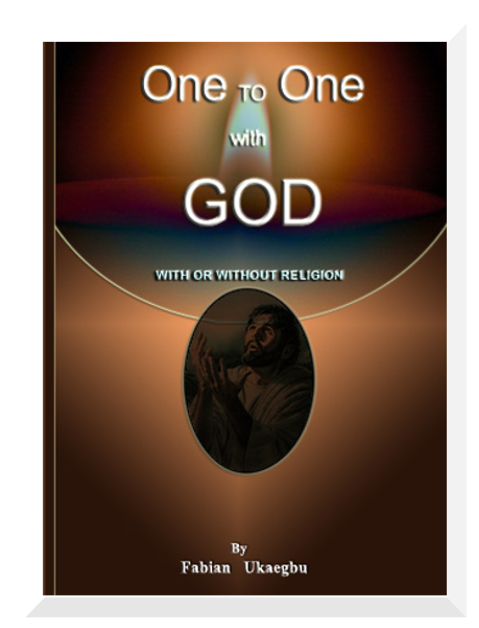
Institutional religion is not as spiritually awakening or productive as personal worship. How did God relate to Noah, Abraham, Isaac, Jacob, Moses and Jesus? Why do references like ?God of Abraham? seem so rare at our time? Is it because they are too challenging or obsolete? The norm in our epoch is institutionalised ? greater but lesser degree to mere ceremony. The history of God?s direct dealings with his humans lacks credibility today, so much, so that our era is spiritually uninspired. Is God absent or have we not taken the true stand necessary to reach the singular faith of the God-fearing? Even the direct link Jesus established with God seems replaced with mere ritual. Is the God of our time asleep, or have we forgotten the right channel to communicate with Him?
Firstly, if someone asked you to define Christianity today, how would you define it? At its source in Nazareth, it was a special personal relationship between Jesus and God, his Father. When it reached Greece, it became a philosophy to help its adherents understand and apply it. In Italy, it became an institution with organs of bureaucracy, including the establishment of priesthood. Moving to the rest of Europe, it became a culture. It became a business when it reached America. The rest of the world (Africa, South America, Asia, etc) was flummoxed or compelled to Christianity by colonial powers; hence, to many of them, Christianity appears superficial, confusing and alien. So what is Christianity and who is a Christian? Christianity is a faith, method, channel, inclination, process or pattern of acting; and, a Christian is one who acts in this way. However, in which ways do Christians act? Do they show personal enterprise or cultural stamina? ? Yes! Do they act institutionally? ? Yes (because life is an institution); philosophically? ? Yes (because philosophy enhances personal reason). Moreover, do Christians have a special personal relationship with God? ? Yes, because that was what Jesus had and actually established.
What would the world be like without religion? By religion, I mean love, trust, respect, faith or feeling. The experiences of Noah, Abraham, Joseph, Moses, Joshua, Samuel, David, Solomon and the Prophets testified to God as the ruler of mankind. Even King Cyrus disclosed his own experience of this in 580 B.C. Then, from 537 B.C., institutional religion in the form of Judaism began and men started to lean more towards religion than to God. Those philosophical persons, eg Aristotle and Socrates with their following were born. Their difference with us is devotion. Whereas they devoted to knowledge we devote to materialism. Today, we act more ostensibly in the name of religion than demonstrating the knowledge of God. In the past, anyone who used God?s name in vain suffered for it. Today, institutional religion has taken men away from God and while humanity is thus adrift, it appears that God does not exist. Today, many who look for God in religion may become aghast because the nature of God is more than any aspect of human interest could claim. Is God religious, historical, economic, medical, scientific or administrative? God is one in all and the source of all knowledge but the abused knowledge becomes evil.
This work as a recovery plan is about to remove the barriers, so that humanity in any work of life does not have to live according to mankind but according to God and can then give personal testimony arising from such relationship. Who should worship God? Everybody who received the gift of life in any field of life should worship God and give testimony of what the Lord has done for him. What is simpler - to praise God alive or allow death to claim the wonders God did for us? Do not in any form or manner say, ?what has the Lord done for me that I should serve him?? Your life is a test field as Israel was (Jos 24); if you abuse God, you will be debased such that your labours taste no good ? what is life overtaken by bitterness, anger and grief?
Before reading this book, consider from its title what you want to achieve because dealing with God is a method of attainment. This does not necessarily mean regularly going to religious worship. There is no insistence that you practice religion only on Sundays: people can go to church for many years without any measure of personal development or attainment. You may have been educated to any level but without spiritual impartation, you may achieve nothing but routine practice, which can lead to boredom, stress and might well end in the grave ? the devil?s yield (Gen. 3: 19). Some might say that they do not believe in a God, who acts like a stern ?Victorian paterfamilias?, but whether they believe or not, has nothing to do with God, but with their personal limitations, which have to be overcome before seeing the truth in another.
The processes the Gospels went through in the course of history watered them down to mere narratives because they happened through bureaucratic processes. What do you understand by the God of Abraham, the God of Isaac and the God of Jacob (Ex 3:15)? God inspires individuals to act in their communities. From the experiences of Israel, particularly of Moses, Joshua and Caleb, which seems easier ? to ask a society or an individual to worship God? How did Jesus deal with God? Institutional worship is superficial and less capable of producing genuine faith for the faith to work. There is too much egotism and too many gaps, as if God could be bribed by the office one holds, or, as if there is a need to pass through a human-kept gate to reach God. Institutional worship reduces individual consciousness and ultimately blasphemes against the God of Abraham, Moses and Jesus. In any human institution, one person inevitably plays or assumes the leadership role, generally in a positive way, but often without superior evidence. However, one-to-one relationship with God restores a special, personal link that could enable anyone to measure his personal development relative to his life mission. Without a personal relationship with God, one may be lost amid modern religious dens in which God is alien.
There has to be a convincing reason for calling oneself an atheist or anti-Christ. This reason should not be institutional but personal, based on evidence or something, which calms one down, rouses interest and at the same time frees one from deception, fear or pessimism. Whatever we do in life that ends or leads to death is worth thinking over in this context. We must aim at doing things that take life beyond death. While alive, we are challenged by the examples of Jesus, which took him beyond death. Historically, the succeeding generations have most often found conflict with the reasoning and actions of their ancestors. This calls for careful scrutiny. So, keeping his situation and circumstances in mind, is there anything Jesus said two thousand years ago that you have found a better way of saying today? Have the circumstances changed? Is there anything he did that you would have avoided as a mistake? Life and death are paradoxes constantly put before us to resolve ? so what would you do to make your life or death sweeter? To achieve this means that you would be satisfied with the tone and outcome of it. This is what we want to achieve with a one-to-one relationship with God.
Table of Content

Fabian N. Ukaegbu was born in Eastern Nigeria. He received his basic education there before travelling to the United Kingdom for further education. He qualified in Marketing, Management, Accountancy and International Relations/Diplomacy. He worked for six and the half years as a Consular Officer in the Nigeria High Commission in London and has worked also as a finance officer for 14 years with the London Borough of Hackney.
He is a prolific writer as indicated by the titles below
His Other Titles Include-